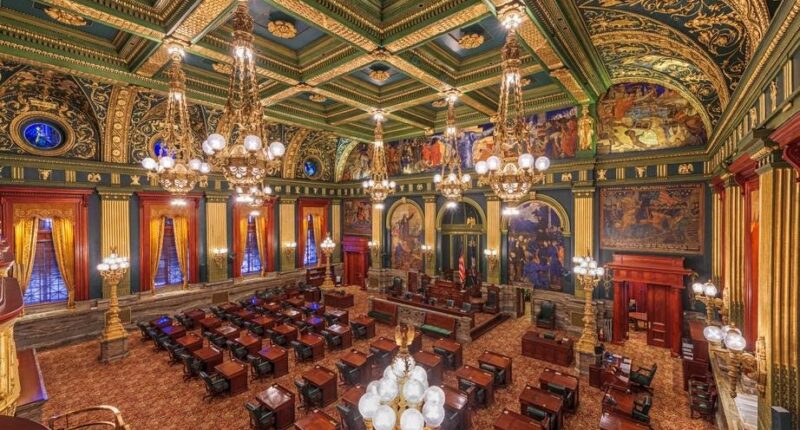Share this @internewscast.com
November has proven to be a pivotal month for Democratic presidential aspirants as the race for 2028 unfolds. Illinois Governor JB Pritzker made headlines by injecting over $25 million of his personal wealth into his campaign coffers, marking a significant financial commitment. On November 10, Pritzker received a warm reception from prominent Texas Democrats during his speech at the annual dinner hosted by the Dallas County Democratic Party.
Meanwhile, California Governor Gavin Newsom captured both national and international attention with his speech at the global climate conference held in Brazil on November 11. His remarks underscored his commitment to environmental issues and positioned him as a notable figure on the world stage. In Pennsylvania, Governor Josh Shapiro reached a milestone by finalizing a long-delayed budget agreement with state legislators on November 12. This agreement notably marked Shapiro as the first Democratic governor to step back from the Regional Greenhouse Gas Initiative (RGGI), a collaborative cap-and-trade program involving several northeastern and mid-Atlantic states.
Governor Shapiro’s decision to withdraw from RGGI has rightly drawn significant attention, yet the permitting reforms he endorsed as part of Pennsylvania’s new budget are equally impactful. These reforms expand the scope of the state’s Streamlining Permits for Economic Expansion and Development (SPEED) program. Launched in June 2025, the SPEED program accelerates permit reviews by allowing businesses to hire private inspectors for technical assessments, a policy that has been praised by the Commonwealth Foundation, a Pennsylvania-based think tank.
The new budget provisions will enable businesses to track permits through an online system, and any permits not processed in a timely fashion by state authorities will be automatically approved, thus accelerating project initiations. Nathan Benefield, Chief Policy Officer at the Commonwealth Foundation, expressed optimism, stating, “With the threat of RGGI off the table, a more prosperous future for Pennsylvania’s energy sector can move forward. That, combined with ‘deemed approved’ permitting reform, will improve Pennsylvania’s economic outlook.”
As Congress deliberates on permitting reforms, such as the proposed federal SPEED Act, state leaders and future gubernatorial candidates are advocating for similar initiatives at the state level. Notably, Congressman Tom Tiffany from Wisconsin, a leading contender for the GOP gubernatorial nomination, is championing the cause of permitting reform both federally and within his state. In a recent op-ed co-authored with Gabriella Hoffman, Director of the Independent Women’s Center for Energy and Conservation, Tiffany argued for the necessity of expediting the approval and construction of essential infrastructure. “The U.S. can continue to uphold its strict environmental and labor standards while speeding up the lengthy and litigious permitting process,” he emphasized, highlighting the need for a balanced approach to meet growing energy demands.
As Congress considers permitting reform, such as the federal SPEED Act, state legislative leaders, governors, and 2026 candidates are advocating complementary state-level actions. Take Congressman Tom Tiffany (R-Wisc.), the front-runner to be the GOP gubernatorial nominee in Wisconsin next year, who is now campaigning on the need for permitting reform at both the federal and state levels.
“With rising electricity demand and the need to source more reliable domestic energy and critical minerals, the U.S. must approve and build more power plants, pipelines, mines and export terminals in a timely manner,” Tiffany wrote in a recent op-ed in the Capitol Times, which he coauthored with Gabriella Hoffman, director of Independent Women’s Center for Energy and Conservation. “The U.S. can continue to uphold its strict environmental and labor standards while speeding up the lengthy and litigious permitting process.”
“While permitting reform is viewed as the sole responsibility of the federal government, states like Wisconsin have a responsibility to participate in the process,” Tiffany and Hoffman added, noting that three-quarters of permits authorized under federal law are issued by state governments. “Moreover, the Foundation for American Innovation’s State Permitting Playbook notes places like Wisconsin boast ‘significant autonomy and flexibility in implementing and enforcing environmental laws’ like the Clean Air Act, the Clean Water Act, and the Endangered Species Act.”
“Unfortunately, Gov. Tony Evers’ Task Force on Climate Change — born from an October 2019 executive order — could hold Wisconsin back from maximizing its potential since it prioritizes climate change over permitting reform,” Tiffany and Hoffman warn. “The governor’s overreliance on renewables like solar and wind, not reliable energy, won’t meet this moment.”
Back in Washington, days after Governor Shapiro signed into law permitting reform as part of a new state budget, the U.S. House Committee on Natural Resources held a full committee markup for three permitting reform bills, including the aforementioned federal SPEED Act. Congressman Bruce Westerman (R-Ark.), chairman of the committee, touted the markup as “an important bipartisan step toward lowering energy prices for hardworking Americans and building critical projects.”
“The increasing demand for electricity and critical minerals is fueling new investments, and federal permitting laws must keep up,” Chairman Westerman added in a statement issued after last week’s markup. “The SPEED Act eliminates bureaucratic delays that hinder projects and restores NEPA to its original purpose. The Committee’s bipartisan support for NEPA reform is a victory for government efficiency, economic growth, national security, transportation infrastructure and lower energy bills for Americans. I thank my colleagues for their hard work on the bills we advanced, and I look forward to advancing them through the legislative process.”
The ongoing buildout of AI-dedicated data centers, which are more energy intensive than traditional data centers, translates into increased demand for electricity that, unless accompanied by a corresponding expansion of power generating capacity, will drive up consumer energy costs. Earlier this year, Goldman Sachs Research estimated that power usage for the global data center market would grow 165% by 2030 relative to 2023. While data centers presently consume 55 gigawatts (GW) of power, Goldman Sachs Research projects that 122 GW of data center capacity will be online by the end of this decade.
“As data centers contribute to a growing need for power, the electric grid will require significant investment,” Goldman Sachs Research noted in February, estimating that such an increase in demand would necessitate $720 billion in new spending to expand electricity generation and transmission infrastructure. “These transmission projects can take several years to permit, and then several more to build, creating another potential bottleneck for data center growth if the regions are not proactive about this given the lead time,” noted James Schneider, a Goldman Sachs senior equity research analyst who focuses on US telecom, digital infrastructure, and IT services.
As federal permitting reform awaits further consideration in Congress and ultimately a floor vote, the recent changes included in Pennsylvania’s new budget, along with Congressman Tiffany’s comments on the gubernatorial campaign trail in Wisconsin, demonstrate there are actions that state officials can take in the near term to advance permitting reform that will help achieved the needed expansion. What’s more, the Keystone State’s new budget, like the recent congressional markup, also underscores the fact that permitting reform can garner bipartisan support and advance even where there is divided government.









